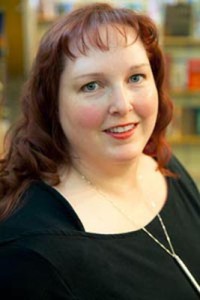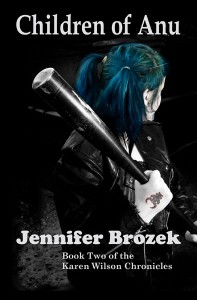
Each week, I’ll pester one of my creative colleagues with five questions about his or her work and, if I’m feeling wicked, deeply personal issues. Most of these folks are friends, a few are secret enemies, and one has been blackmailing me for years.
Jennifer Brozek is one of the many colleagues I knew first online, even though were were more-or-less neighbors. We didn’t meet in the flesh until after I’d moved away from the Emerald City but returned for the Seattle International Film Festival. Our mutual friend Ed Greenwood had suggested I might contribute to Jenn’s Grant’s Pass project. Between movies, Jenn and I got to know each other over bowls of pho. While her anthology sounded terrific, I got caught up in other things and, well, I just never came through for her. Later, I’d bump into her at the Writers Symposium at Gen Con, and once or twice we’ve been on the same panel.
This past year, when another editor mentioned that Jenn was his partner on an upcoming fantasy anthology, I saw my opportunity to make good on my earlier intention. Finally I wrote a story for one of her many anthologies, and I feel I’ve completed a long-deferred quest.
I caught up with Jenn just after her trip to Orycon 2013.
1. Judging by your convention schedule alone, one might consider you the hardest-working editor/writer in the business. How do you balance doing the work with buying, selling, and honing the work?
I’m a very goal-driven person. I keep lists of due dates and a weekly calendar of what must be done that week by day. Then, when I need to work on more than one thing at a time, I block out hours per project per day. In short, I am very organized, and I stick to the schedule I create. I live and die by my own merit. I am my own boss and, sometimes, I can be a real pain in the butt. Fortunately, my husband and friends understand when I say, “I can’t this time, working,” or, “I have one hour to socialize.”
2. When you co-edit a project, how do you and your partner divide the work? Is one of you more concerned with line-edits and the other with content? Is one of you more paperwork and the other more author-wrangling? Which aspects of the job are your strengths?
It is different with each co-editor, and I learn from them as much as they learn from me. We divide the work based on our strengths. We both read the stories. One co-editor could then do the first edit pass with the other doing the second edit pass. Or, we each take half the stories for a first edit pass and then trade for the second edit pass. I usually do the very final consistency polish and, to date, I do most of the paperwork.
3. In the origin story of your geekness, which came first, the fiction or the RPG? How does your work in one field influence your work in the other?
The gaming—by a long shot. And it has influenced me. I tend to write, thinking about the gamer who can break systems. So, I am careful with my world building. Also, I believe working in any other part of the publishing industry influences the other parts. Slush reading teaches you about writing. Writing teaches you about editing. Editing teaches you about writing. All of it teaches you how to interact with every other part. I am a firm believer that every author should read slush for 6–18 months.

4. What is it about our field that demands we sub-categorize everything? For the writer and the reader, is there really a meaningful difference between urban fantasy and paranormal romance? Do epic fantasy and sword & sorcery really need to be separated? What really is the difference between dark fantasy and horror?
I do believe that genres are important. A paranormal romance requires there to be a romantic relationship between the protagonists. In fact, there isn’t a story without it. While an urban fantasy doesn’t require any romance. Dark fantasy tends to be traditional fantasy with a very dark bent while horror tends to be modern day. Also, fantasy generally implies adventure while horror implies a cautionary tale.
You’ll note that I say “generally” a lot because numerous books cross the lines or are “cross-genre.” The categorization helps readers find novels in the vein they are looking for.
5. If you had to give up editing or writing, which would you choose? Which of them helps you more with the other discipline?
I would give up professionally editing. I still have stories to tell that I’m not willing to give up on. But I would miss editing. Really, both skills inform the other. When I edit others I learn how they write and tackle problems. Sometimes, reading it first hand while editing—because you’re so focused on how the story is written than the story itself—you can see how things are done. That’s invaluable.
But I still wouldn’t give up writing.
For lots more info on Jennifer’s upcoming projects, check out her website.
